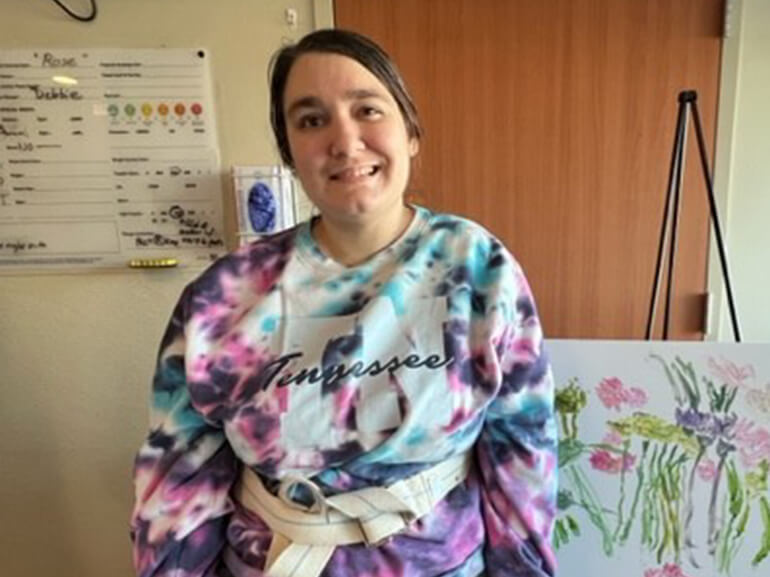Rose's story

Rosemarie “Rose” Principe, a Pennsylvania native, relocated to Tennessee in 2018 to further her career as an antique dealer. An art school graduate with an eye for the beautiful and unique, she enjoyed shopping for antiques, spending time with her family and playing with her cat, Trixie.
When Rose, then a healthy 37-year old, began to feel ill, she wasn’t initially concerned. Suddenly, things took a turn for the worse. After being diagnosed with pneumonia, Rose began to experience chest and leg pain that turned out to be a pulmonary embolism, a dangerous condition when a blood clot travels from the legs to the lungs. When her local hospital in western Tennessee didn’t have any available beds, Rose was transported to a hospital in southeast Missouri. Rose proceeded to undergo a cardiac catheterization to have blood clots removed.
However, one of Rose’s blood clots was missed during her procedure. That clot then traveled to her brain and caused an ischemic stroke (a vessel supplying blood to the brain was obstructed). The damage from Rose’s stroke was devastating, leaving her unable to walk or complete simple tasks. She also experienced cognitive and speech difficulties as well as challenges with swallowing. Rose’s physicians recommended she be transferred to SSM Health Rehabilitation Hospital – Bridgeton, where she could undergo an intensive inpatient rehabilitation program.
Upon admission to SSM Health Rehabilitation Hospital – Bridgeton, Rose was experiencing aphasia, which affects a person's ability to express and understand written and spoken language. She struggled to find the correct words to use and was facing issues with comprehension, problem solving, reasoning and memory. Her stroke had also caused muscle weakness, which affected her ability to speak clearly. Because of her cognitive and speech challenges, Rose initially relied heavily on her mother, who was always by her side, to respond to questions on her behalf.
Rose’s stroke affected her physically as well. She had very little movement and use in her right arm and was unable to transfer or walk without significant assistance. Rose’s physician-led team of nurses and physical, occupational, speech and recreational therapists created a care plan to help her reach her goals of improving her ability to eat and walk.
Speech therapists worked extensively with Rose to improve her communication and cognitive deficits. Rose formed a strong bond with Duo Dog Kia, the facility dog at Bridgeton, so her therapists worked the canine into her therapy sessions as much as possible, specifically when working on word finding, direction following, memory and other cognitive-communicative skills.
“I believe that utilizing Duo Dog Kia as well as the presence of Rose’s mother definitely increased her motivation and helped her with the fantastic gains that she made,” her therapist said. Therapy sessions also focused on guiding Rose through exercises to help her speech become more clear and easy to understand.
Because her stroke had affected her ability to swallow safely, Rose was initially on a soft food diet with thickened liquids. Speech therapists worked with her on swallowing strategies so that she could move to a regular diet.
In physical therapy, Rose’s care team focused on improving her balance and mobility. They worked with Rose on transfers by utilizing a slide board to move between surfaces until she had regained enough function to transfer independently. They practiced walking in the parallel bars to help her balance while aiding her in moving her right leg forward. “During every session Rose had the biggest smile and would always give every exercise, walk and activity 110%,” her therapists noted. Rose was able to utilize the hospital’s exoskeleton, a wearable robotic device used to improve walking function and independence, in her therapy sessions to advance her ability to walk. A turning point in Rose’s rehabilitation came when she was able to move her right leg and foot independently and then progressed to walking with a cane.
Occupational therapists worked with Rose on transfers, specifically stand pivot transfers, which are used when a person can support most of their weight by standing but are too weak to take steps to move from one place to another. Once Rose’s ability to stand and pivot had improved, her team focused on improving her independence with her personal care tasks, including getting in the shower and using the bathroom. Therapists applied electrical stimulation to different areas of Rose’s right arm that resulted in her ability to move her fingers.
In recreational therapy, Rose’s therapists applied her interest in art into her sessions through painting. When she first arrived in rehab, Rose lacked the motivation to paint. However, as she began to regain her abilities, her love of painting returned, culminating with the creation of a painting on a large poster.
Rose spent a total of 50 days at SSM Health Rehabilitation Hospital – Bridgeton, making incredible strides toward her recovery. Her speech had become easier to understand and her word finding and naming skills had improved significantly. She had made good progress in functional day-to-day and work-related tasks including composing emails, participating in simulated phone calls and discussing work functions/tasks. Rose was also able to transfer with minimal assistance and could walk up to 200 feet with a cane.
The resolute support from her family played a vital role in Rose's recovery. Her mother was at the hospital daily and actively participated in Rose’s therapy sessions and family training. Together, they provided her father with regular updates and pictures. “Rose was always positive and ready to work,” her therapists said. “Because of all of Rose’s hard work and amazing support system, Rose was able to discharge home with her family.”
Rose was excited to reunite with her cat and continue her recovery with outpatient physical, occupational and speech therapy. For anyone facing a difficult recovery, Rose offers this advice: “Have faith in yourself and be confident. Don’t give up – keep fighting.”